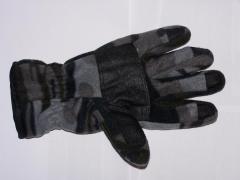
The right glove
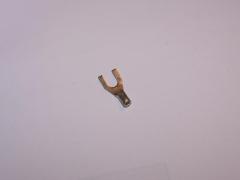
The crimping spade
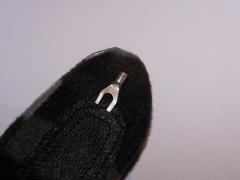
Position of spade
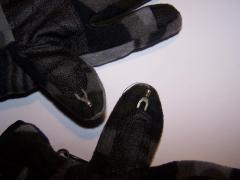
Position of both spades
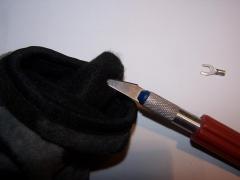
Cutting the inner layer
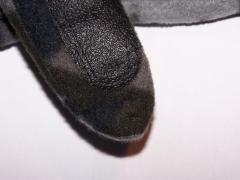
Finished thumb with sewn-in spade
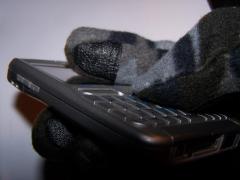
The winter is coming, and cold weather will arrive soon. And, as it happens, human fingers are poorly suitable to operate in cold conditions. Protecting them with gloves is therefore necessary. However, gloves tend to be either inefficient, or thick and unwieldy comparing to naked fingertip. Pressing tiny cellphone buttons when writing SMS messages or emails then becomes a matter of taking the gloves off and freezing one's fingers, or almost always pressing two or more buttons at once.
However, a glove is fairly soft and compressible. It is possible to insert a small item between the finger and the phone keypad, in order to lower the pressure area over the keyboard and achieve the desired spatial resolution.
A glass bead was the first thought, but it was not immediately available. Steel M3 and M4 nut were tested but achieved sub-par performance accuracy-wise; a smaller tip was needed for the required haptic resolution. The junk box yielded some crimping spades, which turned out to be optimal; their relatively large area sits nicely against the thumb and the crimping part not only has the right kind of small edge but also has a longitudal hole that allows easy sewing it in place.
Correct placement of the spade is crucial. The position has to be just right against the thumb, to allow comfortable typing while not be obstructing for other common operations. There were also three choices of location: inside the glove, outside, and between the inner and outer layer. After a number of tests, the last option was chosen; that way there is only small resolution loss on one layer of fabric both ways, the metal part is separated from the phone and other objects so it does not scratch them, and the thread is not being rubbed by force against sharp edges.
The glove thumb was turned inside out, a small incision was made to the inner layer, and the spade was inserted. After putting it in correct orientation and some typing tests, the spade was sewn in place through its wire hole.
The preliminary tests show the method is actually viable. More field tests will be performed in next few days.
 The right glove |  The crimping spade |  Position of spade |  Position of both spades |
 Cutting the inner layer |  Finished thumb with sewn-in spade |